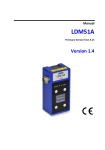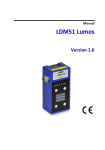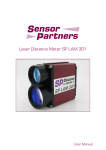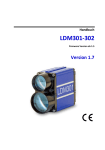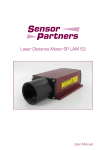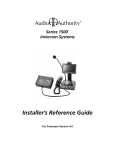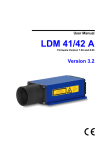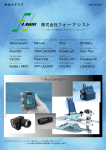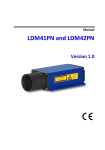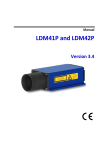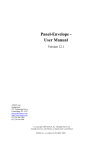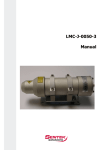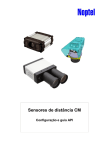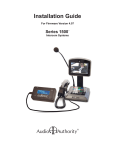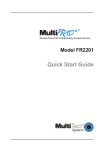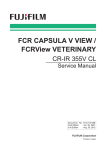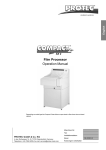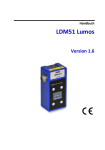Download Manual EN V1.7 - ASTECH Angewandte Sensortechnik GmbH
Transcript
Manual LDM301-302 Firmware Version from 1.5 Version 1.7 LDM301-302 Manual Dear User, You are advised to carefully read this User Manual before turning on the Laser Distance Sensor LDM301 / LDM302 for the first time. This is necessary to ensure that you will be able to use all the capabilities and features provided by your new purchase. This product is subject to ongoing technological developments. Editorial deadline: June 2015 Firmware version: ≥ 1.5 Manual version: V 1.7 File: Manual_LDM301-302_EN_V1.7.docx Note: Proper care has been used in compiling this document. No liability will be accepted in the event of damage resulting from the failure to comply with the information contained herein. Revision history Manual Version 1.7 Date 01.06.2014 Changes New design ASTECH GmbH, Schonenfahrerstr. 5, D-18057 Rostock Internet www.astech.de E-Mail [email protected] Telefon +49 (0)381 / 44073-0 Telefax +49 (0)381 / 44073-20 Page 2 ASTECH GmbH LDM301-302 Manual I. Content Content 1 General Information .................................................................................. 8 2 Safety advice ............................................................................................ 10 2.1 2.2 2.3 2.4 2.5 3 Operating conditions ............................................................................... 16 3.1 3.2 3.3 3.4 4 RS-232 interface .............................................................................. 37 RS-422 interface .............................................................................. 38 Q1 / Q2 – Digital switching output .................................................. 39 QA – Analog output ......................................................................... 41 Trigger Port ..................................................................................... 43 SSI Interface of LDM301S ................................................................ 45 Profibus Interface of LDM301P ....................................................... 46 Installation ............................................................................................... 55 6.1 6.2 7 General device description ............................................................. 19 Technical Data ................................................................................. 21 Device Types.................................................................................... 24 Technical Data LDM302 .................................................................. 25 Laser divergence ............................................................................. 27 Functional Elements ........................................................................ 30 Mechanical Integration Requirements ............................................ 31 Connector pin assignments ............................................................. 32 Status Display .................................................................................. 35 Pilot Laser ........................................................................................ 36 Interface description ................................................................................ 37 5.1 5.2 5.3 5.4 5.5 5.6 5.7 6 Electrical installation conditions ..................................................... 16 Operating and storage conditions ................................................... 16 Appropriate use .............................................................................. 17 Improperly use – error sources ....................................................... 18 Device description.................................................................................... 19 4.1 4.2 4.3 4.4 4.5 4.6 4.7 4.8 4.9 4.10 5 Basic safety advice .......................................................................... 10 Safety advice for operating the laser .............................................. 11 Advice for operating device ............................................................ 13 Norms .............................................................................................. 15 Disposal ........................................................................................... 15 Preparation Work before the installation ....................................... 55 Checklist for installation works ....................................................... 55 Description of commands ........................................................................ 57 ASTECH GmbH Page 3 Content 7.1 7.2 7.3 7.4 7.5 7.6 8 Maintenance by the user ................................................................ 79 Firmware update ............................................................................ 79 Repair .............................................................................................. 79 Malfunction and error messages ............................................................. 80 9.1 9.2 9.3 10 Overview of commands .................................................................. 57 Transmission protocol RS-232 and RS-422 ..................................... 60 Identification ................................................................................... 60 Operation Mode ............................................................................. 62 Status .............................................................................................. 64 Setup Parameter ............................................................................. 66 Maintenance............................................................................................ 79 8.1 8.2 8.3 9 LDM301-302 Manual Malfunction .................................................................................... 80 Error Codes ..................................................................................... 80 Error Status ..................................................................................... 80 Accessories (Options) .............................................................................. 81 10.1 10.2 10.3 10.4 10.5 10.6 10.7 10.8 RS-232 cable ................................................................................... 81 Connection box TCBLDM ................................................................ 82 Adjustment bracket ........................................................................ 82 Dot Sight AD30 ................................................................................ 82 Adapter plate .................................................................................. 83 Dust protection tube....................................................................... 84 Protection Housing ......................................................................... 85 Software LDMTool .......................................................................... 86 11 Part numbers ........................................................................................... 87 12 EG Declaration of conformity .................................................................. 88 Page 4 ASTECH GmbH LDM301-302 Manual II. List of figures List of figures Figure 1 : Device warning sign ......................................................................... 13 Figure 2 : Position of the device warning sign ................................................. 13 Figure 3 : Beam diagram for LDM301 with 1.7 mrad ....................................... 27 Figure 4 : Beam diagram for LDM301 with 10 mrad ........................................ 28 Figure 5 : Beam diagram for LDM302 ............................................................... 29 Figure 6 : Functional Elements ......................................................................... 30 Figure 7 : Dimensions and position of the zero point (in mm) ......................... 31 Figure 8 : Connection drawing of the main connector ..................................... 32 Figure 9 : Connection diagram LDM301S SSI .................................................... 34 Figure 10 : Connection diagram LDM301P Profibus-IN .................................... 34 Figure 11 : Connection diagram LDM301P Profibus-OUT................................. 34 Figure 12 : Status Display .................................................................................. 35 Figure 13 : Pilot Laser position relative to measurement laser ........................ 36 Figure 14 : Wiring RS-232 to D-Sub 9 ................................................................ 37 Figure 15 : Wiring RS-422 to RS-422 unit .......................................................... 38 Figure 16 : Switching behavior of digital outputs ............................................. 39 Figure 17 : Example of switching output wiring ............................................... 40 Figure 18 : Signal diagram of LDM301 analog output ...................................... 41 Figure 19 : Behavior of analog current output ................................................. 41 Figure 20 : Wiring analog output QA of LDM301 ............................................. 42 Figure 21 : Example fort he external wiring oft he trigger input ...................... 44 Figure 22 : Interconnection of several LDM301 devices .................................. 44 Figure 23 SSI connection diagram LDM301S M12 connector ........................... 45 Figure 24 : Profibus connection diagram LDM301P M12 connector ................ 48 Figure 25 : Program LDMTool ........................................................................... 56 Figure 26 : Online Help (Command ID?) ........................................................... 61 Figure 27 Display of all parameters (command PA) ......................................... 64 Figure 28 Parameter reset (command PR) ....................................................... 67 Figure 29 PC-Interface cable with power supply .............................................. 81 Figure 30 Red dot sight ..................................................................................... 82 Figure 31 : Adapater plate ................................................................................ 84 Figure 32 Dust protection tube......................................................................... 85 Figure 33 Protection Housing ........................................................................... 85 ASTECH GmbH Page 5 List of tables III. LDM301-302 Manual List of tables Table 1 : Electrical installation conditions ........................................................ 16 Table 2 : Technical data .................................................................................... 21 Table 3 : Device types ....................................................................................... 24 Table 4 : Technical Data LDM302 ..................................................................... 25 Table 5 : Beam size for LDM301 with 1.7 mrad................................................ 27 Table 6 : Beam size for LDM301 with 10 mrad................................................. 28 Table 7 : Beam size for LDM302 ....................................................................... 29 Table 8 : Pin assignmens of main connector port ............................................ 33 Table 9 : Status display - functions ................................................................... 35 Table 10 : Profibus baud rate depending on segment length .......................... 47 Table 11 : Profibus cable type A features ......................................................... 48 Table 12 : Explanation Profibus parameters .................................................... 49 Table 13 : Profibus parameter .......................................................................... 49 Table 14 : Profibus diagnostic data length ....................................................... 51 Table 15 : Profibus diagnostic data .................................................................. 52 Table 16 : Profibus Input .................................................................................. 53 Table 17 : Profibus Output ............................................................................... 53 Table 18 : Installation of LDM301 .................................................................... 55 Table 19 : Overview of commands ................................................................... 57 Table 20 : Standard deviation for speed measurement ................................... 64 Table 21 : Description for hardware diagnosis ................................................. 65 Table 22 : Pilot laser PLx, x value ...................................................................... 67 Table 23 : Spread of distance measurement .................................................... 71 Table 24 : Error Mode SEx, values for x ............................................................ 72 Table 25 : Function of the switching outputs under different modes.............. 73 Table 26 : Serial output format SDy, parameter y ............................................ 75 Table 27 : Termination character(s) TEx, parameter x ..................................... 77 Table 28 : Malfunction ..................................................................................... 80 Table 29 : Error codes....................................................................................... 80 Table 30 : Error Status ...................................................................................... 80 Table 31 : Connection of programming cable PC sided.................................... 81 Table 32 : Connection of programming cable LDM301 sided .......................... 81 Table 33 : Part numbers ................................................................................... 87 Page 6 ASTECH GmbH LDM301-302 Manual Used Symbols Sign warns against emitting visible and invisible laser radiation. Sign warns against danger of electrical power and of electric shock. Sign warns against danger. Sign shows information for use in hazardous environments. Sign indicates important information regarding device use of the device. The sign shows protection class 3 (protective extra-low voltage). Sign indicates degree of protection (IP) of the device. Sign informs that special guidelines had to be applied for device disposal. ASTECH GmbH Page 7 General Information 1 LDM301-302 Manual General Information The laser distance measurement device LDM301 is developed for industrial applications. It enables the non-contact measurement of distances and speed with a precision down to the centimeter. The device measures with short measurement time onto any diffusely reflecting target surface also without using a reflector. Depending on the type, two switching outputs and the following interfaces are available: RS-232, RS-422 and analog output, SSI or Profibus. The device is easy to install and operate. An LED display on the rear side of the device enables the user to monitor the device in operation. The compact and rugged design, the easy installation, low current consumption, adjustable switching outputs and the possibility to set user specific parameters are important features of the LDM 301. The features of the device enable a number of applications in industrial environment: Process surveillance in steel and roller plants Fill level measurement Surveillance of object movements Positioning of cranes and loading facilities Measurement of inaccessible measurement areas, e.g. in hollow spaces, tubes and containers Position surveillance of vehicles and ships As standard, the LDM301 is equipped with integrated heating, status display and a sight mechanism. The alignment to the measurement objective is easy by the red laser dot of the pilot laser The modular construction of the device enables the easy upgrade with additional equipment or the customization for specific applications. Page 8 ASTECH GmbH LDM301-302 Manual General Information The device operates on the basis of time of flight measurement. Short laser pulses are transmitted. The light pulse reflected from the target is detected by the receiver. The distance can be determined by the time shift. The measurement range depends on the reflectivity and the surface of the measuring target. ASTECH GmbH Page 9 Safety advice 2 Safety advice 2.1 Basic safety advice LDM301-302 Manual Please read the safety and operating advice carefully, and observe the advice when operating the device. Danger, laser radiation Do not open the LDM30x, otherwise Laser radiation can be emitted that can cause eye injuries. Please observe all information and guidelines for operating the Laser. Danger, electric shock The LDM30x may only be opened for repair purposes by the manufacturer. If the device is opened arbitrarily without authorization, all warranty claims will expire. The operating and storage conditions have to be observed (see chapter 3). The inobservance of this advice and the adverse use of the device can lead to injuries of the user or to damage of the device. Connectors may not be plugged or unplugged when voltage is applied. All installation work may only be carried out when no voltage is applied. The device may only be operated as intended and in faultless condition. Safety installations must not be rendered ineffective. Safety and warning signs must not be removed. Protection Class 3, low voltage The device LDM30x operates with low voltage of DC 10 to 30 volts. Page 10 ASTECH GmbH LDM301-302 Manual Safety advice Protection degree: In accordance with the Protection Degree IP67, the LDM30x is protected against jet water and dust, and against short submersion into water. When operating the device under extreme outdoor environmental conditions, the use of additional weather protection is recommended (e.g. a cover plate with a short distance to the LDS30A). Rapid temperature changes can lead to humidity entering the device. The device is not shatter-proof. Do not let the device fall onto the ground, and avoid any shock. The device is delivered in a solid cardboard box, which is suited for the transport of the device. The device may not be used in explosive environments; otherwise there is the danger of damage to the LDM30x and the surrounding equipment, and of injuries of the user. 2.2 Safety advice for operating the laser The LDM30x is equipped with two lasers: Laser for measurement (invisible) - Laser Class 1 Pilot Laser (visible red) Laser Class 2 - Safety advice for laser class 1 – Measurement Laser The measurement laser is a class 1 laser device based on the norm IEC 60825-1:2003 (Safety of laser products – Part 1: equipment classification and requirements). The laser radiation of class 1 lasers does not imply any danger to the human eye; any injury of the human eye can be excluded. ASTECH GmbH Page 11 Safety advice LDM301-302 Manual Safety advice for laser class 2 – Pilot Laser The pilot laser is a class 2 laser device based on the norm IEC 60825-1:2007 (Safety of laser products – Part 1: equipment classification and requirements). The Laser power is limited to maximum 1 mW. The Laser radiation is visible. A short-term exposure (duration up to 0.25 s) is harmless to the eye. Users are instructed by Laser warning sing (see VERWEIS) to do not stare into the beam. They have to protect themselves by turn the head and/or the closing the eyes and by avoid a long look into the beam. The sensor can be used without any additional safety protection. Danger: Laser radiation Class 2, do not stare into the Laser beam! Do not look into the Laser beam with optical instruments. Do not direct the Laser beam onto persons. Page 12 ASTECH GmbH LDM301-302 Manual Figure 1 : Device warning sign Safety advice 1 Figure 2 : Position of the device warning sign 2.3 2 Advice for operating device The LDM30x should not be put into operation when optical parts are fogged or dirty. The optical components of the equipment should not be touched with bare hands! Dust and dirt are removed from the optical components with extreme caution! Cleaning with solvents or mechanical means is not allowed. The device must be protected against overheating. The device will not be switched off automatically when the operating temperatures are exceeded. The persisting overheating of the device will lead to a reduced lifetime of the laser diode. The device must be protected from impact. The device must be protected from extreme temperature 1 The devices of the LDM301 series can vary with regard to the divergence of the laser diode and the maximum measurement frequency displayed on the laser labels. 2 A second laser warning sign is inside the delivery. It is to be attached to the installation place and must be easy to view for the operator. ASTECH GmbH Page 13 Safety advice LDM301-302 Manual fluctuations. When extreme temperature fluctuations are occurring use additional protection housing. It is not allowed to operate the device in explosive environments. The device corresponds to the protection degree IP 67, and is protected against jet water and short submersion. Please observe the conditions for the protection degree IP 67, and observe especially the following advice: The device must not be exposed to persisting driving rain or high temperature variations. If the device is exposed to humidity, the temperature difference between the device and the environment may be ± 5K maximum. It is necessary to observe the operating and storage conditions. Use only a supply voltage of 10 V ... 30 V DC (direct current voltage). For using the heating, direct current voltage of 24 V is recommended. The limit values for the input voltage have to be observed. Do not wire inputs as outputs. All outputs are resistant to short circuits. The housing is galvanically separated from the sensor electronics assembly. The interference resistance at electrostatic discharge (ESD) is 4 kV according to EN 61326-1. Page 14 ASTECH GmbH LDM301-302 Manual 2.4 Safety advice Norms The device conforms to the following norms: IEC 61326-1:2005 Electrical equipment for measurement, control and laboratory use - EMC requirements - Part 1: General requirements (IEC 61326-1:2005); German version EN 61326-1:2006 IEC 60825-1:2007 Safety of Laser products – Part 1: equipment classification and requirements (IEC 60825-1:2007) Laser Class 1 (Measurement Laser) Laser Class 2 (Pilot Laser) Safety requirements for electrical equipment for measurement, control and laboratory use - General requirements (IEC 61010-1:2001); German version EN 61010-1:2001 IEC 61010-1:2001 2.5 Disposal For the disposal of the device, special environmental protection guidelines apply. Do not dispose the device with the usual domestic refuse. The manufacturer offers to take back the device after the end of the product life cycle, and to dispose of the product in accordance with the effective environmental protection guidelines. Please note that this service is subject to a charge. ASTECH GmbH Page 15 Operating conditions LDM301-302 Manual 3 Operating conditions 3.1 Electrical installation conditions Use only a supply voltage of 10 V ... 30 V DC (direct current voltage). For using the heating, direct current voltage of 24 V is recommended. The limit values for the input voltage have to be observed. Do not wire inputs as outputs. All outputs are short circuit proof. The housing is galvanically separated from the sensor electronics assembly. The interference resistance at electrostatic discharge (ESD) is 4 kV according to EN 61326-1. Table 1 : Electrical installation conditions Electrical installation conditions 3 Supply voltage 10 V ... 30 V DC (direct current voltage) Power consumption < 5 W (without heating) 11.5 W (with heating, 24 V) 3.2 Operating and storage conditions Operating temperature -40 °C … +60 °C Stroage temperature -40 °C ... +70 °C Air humidity 15 % ... 90 % not condensing The mentioned operating and storage conditions have to be observed. When the operating temperatures exceed the permitted values, the device will not be switched off automatically. The continuous overheating of the device will reduce the lifetime of the laser diode. 3 For using the heating, direct current voltage of 24 V is recommended. Page 16 ASTECH GmbH LDM301-302 Manual 3.3 Operating conditions Appropriate use The device is intended for the following applications: Distance and speed measurement and output of measured data via the interfaces RS-232, RS-422, analog output SSI or Profibus. Use of the special measurement functions Operating with the correct voltage Observing the environmental conditions, operating and storage temperature Use in industrial environments complying with the standard IP 67 (protected against splash and jet water) Control of the data interfaces using the indicated signal levels Measurement through optically transparent material Measurement through optically transparent materials such as glass, optical filters, acrylic glass etc. can lead to erroneous measurement results. When measuring through optically transparent material, use the function “measurement window”. By defining a fixed measurement range using this function, the display of an erroneous measurement value caused by the optical medium in front of the laser can be avoided. Please take care that the surface of the medium is clean and light- transparent. Measuring distances < 8 m Due to the optical system of the receiver, the device LDM301 with a divergence of 1.7 mrad receives only scattered light at distances < 8 m. Therefore, measurement in this range is only possible onto targets with good reflective properties. As an alternative, an LDM301 with 10 mrad can be used, as this device does not imply any restrictions for distance measurement. ASTECH GmbH Page 17 Operating conditions 3.4 LDM301-302 Manual Improperly use – error sources The device may only be used when the safety advice described in chapter 0 is observed. The non-observance of the safety advice can lead to damages of the device or to injuries of the eyes. To achieve correct measurement results, avoid the following error sources: Page 18 Measurement against the sun or other intense light sources Measurement onto low reflective target surfaces in highly reflective environments Measurements onto highly reflective surfaces (mirror) Rapidly-changing measurement conditions (rapid distance changes) Two or more LDM301 may not be "frontal view" because the devices interact. To avoid false readings, the devices must be successively raised. Use the trigger generator TPG1 (accessory) or the trigger function according to item 2 in chapter 5.5 (Interconnection of several LDM301). Operation and storage of the device under conditions that do not conform with the specifications Overheating The operating temperatures have to be observed. The overheating of the device has to be avoided in any case. When the operating temperatures are exceeded, the device is not switched off automatically. Persisting overheating of the device leads to a reduced lifetime of the laser diode. ASTECH GmbH LDM301-302 Manual 4 Device description 4.1 General device description Device description The laser distance measurement device LDM301 is intended for distance measurement onto static and moving objects with a precision down to the centimetre: Measurement in the range of 0.5 m ... 300 m onto natural surfaces with 90 % reflectivity. Measurement onto reflectors (e.g. Scotchlite 3000x) at distances between 300 m and 3000 m. For speed measurement in the range of 0 m/s ... 100 m/s (distance 0.5 m ... 700 m For measuring distances < 300 m, the use of glass reflectors (triple mirrors) is not recommended, as a distortion of measurement values can be caused by overload. Pilot Laser With the red laser measurement spot (pilot laser), the measurement target can be clearly identified. The range depends on the reflectivity and the surface properties of the measurement target. Serial interfaces The LDM301 is equipped either with an RS-232 or with an RS-422 interface. The device configuration is carried out during the assembly. The device cannot be changed retroactively. Outputs The device is equipped with two switching outputs, an analog output (4 mA ... 20 mA) and an external trigger connection. All outputs are parameterizable. Heating ASTECH GmbH Page 19 Device description LDM301-302 Manual When certain temperature thresholds are exceeded, the heating is swichted on or off automatically. Values preset in the factory: +4 °C heating is switched on and +10 °C heating is switched off. The values can be specifically configured by the user (refer to REF HE) Page 20 ASTECH GmbH LDM301-302 Manual 4.2 Device description Technical Data Table 2 : Technical data Measurement properties Measurement principle Laser pulse - Time of flight measurement 4 Measurement range 5 onto natural surfaces 6 onto target board 0.5 m ... 300 m 300 m ... 3000 m Measurement precision 20 mm (measurement value output 100 Hz; measurement frequency 2 kHz) 60 mm (measurement value output 2 kHz) Measurement value resolution (distance) 1 mm Measurement time for distance Standard: 0.5 ms Special version: 0.1 ms Measurement range for speed Measurement time for speed 7 -1 -1 0 ms ... 100 ms 0.1 s ... 0.5 s Laser Laser for measurements Laser class 1 (infrared, non visible) Laser beam divergence Standard: 1.7 mrad Option: 10 mrad Wavelength 905 nm 4 depends on the reflection properties of the target, ambient light influence and atmospherically conditions 5 natural, diffusely reflecting surfaces, under 10 m don’t use low reflective materials (dark/black surface) for target 6 e.g. Scotch Lite 3000x 7 Distance range: 0.5 m ... 700 m ASTECH GmbH Page 21 Device description LDM301-302 Manual Laser Pilot Laser Laser Class 2 (red visible) Wavelength 635 nm Electrical installation conditions Supply voltage 10 V ... 30 V DC Power consumption < 5 W (without heating) 11.5 W (with heating at 24 V) Interface / Connections Interfaces 1 x 12-pole (Binder series 723) M18 8 2 x 5 pole (Binder series 766 (M12 B-coded ) Serial interfaces RS-232 or optionally RS-422, 9.6 kBaud ... 460.8 kBaud, format 8N1, ASCII DP-V0 Slave IEC 61158 / IEC 61784 9,6 kBaud ... 12 Mbaud, auto detect, termination resistor extern, slave address can be set via Profibus 50 kHz ... 1 MHz, 25 µs pause 24 bit, binary or gray coded can be set Profibus (LDM301P) SSI (LDM301S) 8 9 Switching output 2 x "High-Side-switch", load up to 0.2 A, Permanent short circuit protected, Adjustable window function Analog output 4 mA ... 20 mA Trigger for device synchronization 1 x Trigger IN/OUT, edge and delay adjustable, trigger level 3 VDC ... 30 VDC Operating modes Single measurement |continuous measurement, mean value, external 9 only LDM301P and LDM301S Total output error for 20mA: + 0,15 % @ temperature +25 °C Page 22 ASTECH GmbH LDM301-302 Manual Device description Interface / Connections triggering (adjustable near field suppression and window function Environmental and application conditions Operating temperature -40 °C ... +60 °C Storage temperature -40 °C ... +70 °C Air humidity 15 % ... 90 % Dimensions (LxWxH) 136 mm × 57 mm × 104 mm Weight Approx. 800 g Protection degree IP 67 EMC IEC 61326-1:2005 ASTECH GmbH Page 23 Device description 4.3 LDM301-302 Manual Device Types The LDM301 is available in different designs and with different interfaces. The following devices are available: Table 3 : Device types Type LDM301A-RS232 LDM301A-RS422 LDM301P LDM301S Serial Interface RS-232 RS-422 RS-232 RS-232 Analog output Yes Yes Yes Yes Profibus - - Yes - SSI - - - Yes In addition, the devices can be ordered - depending on the measurement task 10 - with the following features : Increased maximum measurement frequency, 10 kHz instead of the standard of 2 kHz Laser with increased divergence, 10 mrad instead of standard 1.7 mrad 10 not with LDM301S and LDM301P Page 24 ASTECH GmbH LDM301-302 Manual 4.4 Device description Technical Data LDM302 The LDM302 is a special version of the LDM301. It was designed for badly reflecting surfaces due to an adapted signal processing. Both gauges use the same hardware and software basics. All the information in this manual are valid for both devices as far as there is no other statement. Table 4 : Technical Data LDM302 Measurement properties Measurement principle Laser pulse - Time of flight measurement 11 Measurement range onto natural surfaces (10 %) 12 onto target board Measurement precision Measurement value resolution (distance) Measurement time for distance 13 Measurement range for speed Measurement time for speed Laser Laser for measurements Pilot Laser 0.5 m ... 300 m 300 m ... 3000 m 14 mm at 100 Hz measuring rate and 10 Hz output range 1 mm 100 ms -1 -1 0 ms ... 100 ms 0.1 s ... 0.5 s Laser class 1 (infrared, non visible) Laser beam divergence: 1.7 mrad Wavelength 905 nm Laser Class 2 (red visible) Wavelength 635 nm 11 depends on the reflection properties of the target, ambient light influence and atmospherically conditions 12 natural, diffusely reflecting surfaces, under 10 m don’t use low reflective materials (dark/black surface) for target 13 Distance range: 0.5 m ... 700 m ASTECH GmbH Page 25 Device description LDM301-302 Manual Electrical installation conditions Supply voltage 10 V ... 30 V DC Power consumption < 5 W (without heating) 11.5 W (with heating at 24 V) Interface / Connections Interfaces Serial interfaces Switching output Analog output Trigger for device synchronization Operating modes 1 x 12-pole (Binder series 723) M18 RS-232 or optionally RS-422, 9.6 kBaud ... 460.8 kBaud, format 8N1, ASCII 2 x "High-Side-switch", load up to 0.2 A, Permanent short circuit protected, Adjustable window function 14 4 mA ... 20 mA 1 x Trigger IN/OUT, edge and delay adjustable, trigger level 3 VDC ... 30 VDC Single measurement |continuous measurement, mean value, external triggering (adjustable near field suppression and window function Environmental and application conditions Operating temperature -40 °C ... +60 °C Storage temperature -40 °C ... +70 °C Air humidity 15 % ... 90 % Dimensions (LxWxH) 136 mm × 57 mm × 104 mm Weight Approx. 800 g Protection degree IP 67 EMC IEC 61326-1:2005 14 Total output error for 20mA: + 0,15 % @ temperature +25 °C Page 26 ASTECH GmbH LDM301-302 Manual 4.5 Device description Laser divergence The LDM301 is available in two different versions with respect to the laser divergence. LDM301 with 1.7 mrad (Standard) Figure 3 : Beam diagram for LDM301 with 1.7 mrad The divergence of the laser is 1.7 mrad x 0.08 mrad (rectangle). The receiver divergence is 2.9 mrad (circle). Table 5 : Beam size for LDM301 with 1.7 mrad Distance Transmitter, width [mm] Transmitter, heigth [mm] ASTECH GmbH 0m 53,2 1m 53,3 5m 53,6 10 m 54,0 50 m 57,4 100 m 61,5 18,7 20,4 27,0 35,4 102,0 185,4 Page 27 Device description LDM301-302 Manual LDM301 with 10 mrad (Option) Figure 4 : Beam diagram for LDM301 with 10 mrad The divergence of the laser is 10 mrad x 0.5 mrad (rectangle). The receiver divergence is 14.3 mrad (circle). Table 6 : Beam size for LDM301 with 10 mrad Distance Transmitter, width [mm] Transmitter, height [mm] Page 28 0m 15,5 1m 15,8 5m 16,9 10 m 18,4 50 m 29,8 100 m 44,1 5,3 11,0 33,9 62,5 291,0 576,7 ASTECH GmbH LDM301-302 Manual Device description LDM302 with 3.7 mrad (Standard) Figure 5 : Beam diagram for LDM302 The divergence of the laser is 3.7 mrad x 3.7 mrad (square). The receiver divergence is 6.3 mrad (circle). Table 7 : Beam size for LDM302 Distance Transmitter, width [mm] Transmitter, heigth [mm] ASTECH GmbH 0m 30 1m 33 5m 48 10 m 70 50 m 215 100 m 400 30 33,7 48 70 215 400 Page 29 Device description 4.6 LDM301-302 Manual Functional Elements The casing consists of a robust, corrosion-resistant extrusion-molded aluminum structure with a front cover plate and a back cover plate equally corrosion-resistant. On each lateral side and on the underside of the LDM 301 casing there are three support pads with mounting holes (M4) for mechanical attachment of the LDM 301 (see Figure 7). 1 Front tube 2 Transmitter optics 3 Receiver optics 4 Front cover plate 5 Casing 6 Back cover plate 7 Pilot Laser Figure 6 : Functional Elements Page 30 8 10 11 12 13 14 11 mm-rail Status display Main connector (M18) Service screw Support pads with M4 x 6 optional connectors Profibus or SSI ASTECH GmbH LDM301-302 Manual 4.7 Device description Mechanical Integration Requirements For integration of the LDM301 Laser Distance Meter, three different versions of mechanical attachment are available. 1. 2. 3. Attachment to a lateral surface: For attachment to the lateral surfaces, the LDM301 provides three support pads (Figure 7) with mounting holes (M4 x 6). Attachment to casing bottom: Likewise, the LDM301 provides three support pads (Figure 7) with mounting holes (M4 x 6) for attachment to the bottom face of its casing. Attachment via adapter plate (replacement of LDM300C): To replace an LDM300C with an LDM301, an adapter plate is required. This plate must be screwed to the bottom side of the LDM301. Figure 7 : Dimensions and position of the zero point (in mm) ASTECH GmbH Page 31 Device description LDM301-302 Manual The zero point of LDM301 corresponds to the external surface of the front cover. 4.8 Connector pin assignments Depending on the implemented configuration version of the various LDM 301 models, different terminal facilities are available for connections. All models share the same type of main connector port. Main Connector Port (M18) The main connector port (see Figure 6 : Functional Elements, no. 11) includes the terminal points for voltage supply, for serial data communication (RS-232 or RS-422), for the two switching outputs (Q1 and Q2), one analog output (QA) and for one trigger port (TRIG). A shielded cable must be used for connection. This cable is included in delivery. Figure 8 : Connection drawing of the main connector Page 32 ASTECH GmbH LDM301-302 Manual Device description Heed cable colours: blue – VCC and gray/pink – GND! Please use only high quality shielded cable. Table 8 : Pin assignmens of main connector port Pin Colour code of cable RS-232 RS-422 Description A White TxD RX+ RS-232 send data / RS-422 receive data + B Brown RxD RX- RS-232 receive data / RS-422 receive data - C Green TRIG TRIG Trigger port D Yellow QA QA Analog output (4 … 20 mA) E Grey TX- TX- RS-422 send data - F Pink TX+ TX+ RS-422 send data + G Blue VCC VCC Supply voltage H Red n.c. n.c. not connected J Black GND GND GND K Violet Q2 Q2 Switching output Q2 L Grey/pink GND GND GND M Red/blue Q1 Q1 Switching output Q1 SSI Port of LDM301S (M12) The connection to the SSI interface of the LDM301S is accomplished via a 5pole, B-encoded M12 male connector. Shielded cables should be used for connection. The second M12 connector is not used. ASTECH GmbH Page 33 Device description LDM301-302 Manual Figure 9 : Connection diagram LDM301S SSI Profibus Port of LDM301P (M12) For Profibus connection there are 3 B-encoded 5-pole M12 connectors. The connection must be made with Profibus conform cables. Figure 10 : Connection diagram LDM301P Profibus-IN Figure 11 : Connection diagram LDM301P Profibus-OUT Page 34 ASTECH GmbH LDM301-302 Manual 4.9 Device description Status Display Figure 12 : Status Display Table 9 : Status display - functions LED Target Function Reflectivity Status Readiness for action Q1 Switching output 1 Switching output 2 Status interface Q2 Link Display Off Red blinking Red Yellow Green Green blinking Off Red Green Off Yellow Off Yellow Off Red Yellow Green ASTECH GmbH Status No signal Very weak signal Weak signal Signal available Good signal Very good signal No operating voltage Technical defect Voltage supplied, Ready for action Off Operating voltage supplied Off Operating voltage supplied No field bus Profibus error Operating voltage supplied, Profibus inactive Operating voltage supplied, Profibus working Page 35 Device description 4.10 LDM301-302 Manual Pilot Laser The pilot laser (see Figure 7) is intended to support alignment to a given target point during start-up action of the LDM 301. It qualifies as a Class 2 Laser device and operates at 635 nm (red) in the visible range. The pilot laser is not aligned to emit in a direction parallel with the measurement Laser. Instead, its beam intersects with that of the measurement Laser at a distance of 75 m. Figure 13 shows the tolerance on pilot laser position in relation to the invisible measurement laser as a function of the distance to an object being measured: 10 m 75 m 125 m Figure 13 : Pilot Laser position relative to measurement laser Page 36 ASTECH GmbH LDM301-302 Manual 5 Interface description Interface description For interfacing, the LDM 301 provides different connectors depending on the type (see chapter 4.3, Device Types). A main connector port (Figure 7) is used for RS-232- or RS-422-interface and analog output and additional connectors provide SSI interface (Figure 8, no. 3) or Profibus interface (Figure 8). 5.1 RS-232 interface Figure 14 : Wiring RS-232 to D-Sub 9 ASTECH GmbH Page 37 Interface description 5.2 LDM301-302 Manual RS-422 interface Figure 15 : Wiring RS-422 to RS-422 unit Page 38 ASTECH GmbH LDM301-302 Manual 5.3 Interface description Q1 / Q2 – Digital switching output The purpose of Q1 and Q2 is to represent distance readings as logic operation data. They report events of positive or negative exceeding of a preset switching range with a certain amount of hysteresis. Accordingly, they are perfectly suited for direct reprocessing of monitored quantities such as filling level or for detection of objects. Parameter settings are made via the serial interface. The command to achieve this is Q1w_x_y_z (where “_” is equivalent to space (0x20)). Value w x y z Description Switching threshold Specification -9999.99 ... +9999.99 Switching range x ≥ 0; x ≥ y Hysteresis y≥0 Switching state z = 0 or 1 Figure 16 : Switching behavior of digital outputs LOW = 0 HIGH = 1 ASTECH GmbH U<1V U = operating voltage– 1 V Page 39 Interface description LDM301-302 Manual Figure 17 : Example of switching output wiring Page 40 ASTECH GmbH LDM301-302 Manual 5.4 Interface description QA – Analog output The analog output enables the normed, analog transmission of distance data across large distances using a two-wire line. The current of 4 mA to 20 mA impressed in the line is proportional to the measured distance within an adjustable distance interval. Parameterization is done via the serial interface. Properties of the analog output: Measuring value output range 4 mA ... 20 mA Indication in case of an error: 3 mA or 21 mA (selectable via the parameter SE) Resolution: 16 bit DA-converter Load ≤ 500 Ohm/0,5W The command to achieve this is QAx_y (where “_” is equivalent to space (0x20)). Parameter settings for current output in the event of measurement failure can be made using the command SEx. Value Description Specification x Lower Limit x≠y y UpperLimit y≠x Figure 18 : Signal diagram of LDM301 analog output The value of output current (mA) is calculated as follows: 𝐷𝑖𝑠𝑡.−𝑥 x<y 𝑄𝐴[𝑚𝐴] = 4 𝑚𝐴 + 16 ∗ x>y 𝑄𝐴[𝑚𝐴] = 20 𝑚𝐴 + 16 ∗ 𝑦−𝑥 ∗ 𝑚𝐴 𝐷𝑖𝑠𝑡.−𝑥 𝑥−𝑦 ∗ 𝑚𝐴 Figure 19 : Behavior of analog current output ASTECH GmbH Page 41 Interface description LDM301-302 Manual Figure 20 : Wiring analog output QA of LDM301 Page 42 ASTECH GmbH LDM301-302 Manual 5.5 Interface description Trigger Port The trigger port allows two different uses: 1. Start a single distance measurement DF by an external signal in the form of a voltage pulse, the delay of the release trigger (trigger delay) and to triggered edge (trigger level) may be set. 2. Interconnection of several LDM301: a) The first LDM301 is working as master in the mode DT or DM; when the laser impulse is started, a trigger signal is sent simultaneously. b) The 2. LDM301 and further LDMs working as slaves in mode DF (Trigger input). They will start a measurement after the first LDM301. By a temporal delay between the measurements, which is adjustable with the trigger delay, interference between the devices can be excluded. The trigger frequency corresponds to the set frequency MF of the first LDM301. Parameter TD: z = 0 mandatory x = delay is necessary15; interference between the different LDM301 is avoided. The parameterization of the trigger connection is carried out via the serial interface. Command TDx_y. (“_“ corresponds to empty space (0x20)) The trigger function is only active in the measurement mode DF. Voltage level for the trigger signals: 15 Low level High level Threshold Hysteresis 0 – 1,5 V 3 – 30 V 2.25 V 0.1 V Depending on the measuring time (see also TD and SA) ASTECH GmbH Page 43 Interface description LDM301-302 Manual Figure 21 : Example fort he external wiring oft he trigger input Figure 22 : Interconnection of several LDM301 devices Page 44 ASTECH GmbH LDM301-302 Manual 5.6 Interface description SSI Interface of LDM301S Specification The LDM301S is equipped with an SSI-data interface (SSI = synchronous serial interface). By the SSI master the current measurement data is collected, it sends to the clock for the shift register in the slave. The SSI slave sends its data from the shift register bit by bit to the master. Depending on the length and quality of the data cable transfer rates of 50 kHz to 1 MHz at 25 microseconds interval time between two bit streams are possible. The data length is 24 bits plus one validity bit. The format can be binary or gray-encoded. For parameter settings via the serial interface, the SCx command is available. SCx x=0...binary, 25 bits (24 bits plus 1 validity bit) x=1...gray, 25 bits (24 bits plus 1 validity bit) Bit stream: 24 23 MSB .................................. Bit 1 – 24 distance depending on preset scale factor 2 1 0 LSB *) *) Bit 0: validity bit Electrical Connection SSI SSI (2) Dummy (3) Figure 23 SSI connection diagram LDM301S M12 connector ASTECH GmbH Page 45 Interface description 5.7 LDM301-302 Manual Profibus Interface of LDM301P General LDM301P supports the Encoder-Profile of the Profibus (No. 3062 of the PNO). The LDM301P is used here as a linear encoder. As part of the encoder profile, the LDM301P can work as Class1 or Class2 (recommended) encoder. All variants are implemented via the GSD file. In addition to the specific profile data the LDM301P provide specific settings. These relate to the control of the laser and the diagnostic data. The LDM301P has the ID number 0AA2 (HEX). Installation conditions The LDM301 can be connected to each Profibus-DP structure. The corresponding Profibus DP Master must be able to send a parameterization telegram. The corresponding development tool (usually development software) must be able to support the display of the parameters in the device master file (GSD). Parameters entered via the serial port are overwritten by the master at startup by parameters of the field bus interface! If the master does not send parameters the LDM301P starts with the stored parameters. GSD File The GSD-file has the name LDM301P2.GSD. The files LDM301P.dib and LDM301P.bmp belong to the GSD-file and serve for the display of the LDM301 in the projection tool. The integration of the files is described in the documentation of the projecting tool. Slave Address The Profibus slave address is adjustable subject to the other device in the range of 0 ... 125. The address is done by SSA-command of the Profibus. For information on how to change the slave address via the editing tool, you should consult the special editing tool documentation. Page 46 ASTECH GmbH LDM301-302 Manual Interface description On delivery the address is 4 (alternatively, a label with the given address exists). The slave address is permanently stored in EEPROM and retained even after power failure. If several slaves (LDM301P) are operated on a Profibus, please connect successively and set different addresses. Bus Termination For LDM 301 operation, an external bus terminator must be installed. Voltage supply of 5 V required for the terminator is available at Profibus-OUT. This 5 V supply is electrically isolated from general voltage supply (VCC) and rated for a current load up to 100 mA. The terminating resistor is available as an accessory item. Baud Rate The LDM 301 provides automatic detection of the following baud rates: 9.6 / 19.2 / 93.75 / 187.5 / 500 k baud and 1.5 / 3 / 6 / 12 MBaud. Segment Length The maximum allowed segment length between to Profibus participants depends on the selected baud rate. The following rules on segment lengths must be fulfilled: Table 10 : Profibus baud rate depending on segment length Baud rate [baud] Segment length [m] 9.6 k – 93.75 k 1200 187.5 k 1000 500 k 400 1.5 M 200 3 M – 12 M 100 To comply with the segment rules, the use of cable type A is strongly recommended. ASTECH GmbH Page 47 Interface description LDM301-302 Manual Table 11 : Profibus cable type A features Parameter Value Wave resistance 135 ... 165 Ohm Capacitance per unit length < 30 pf/m Loop resistance < 110 Ohm/km Cable wire diameter > 0.64 mm Cable wire cross-section > 0.34 mm² Profibus Electrical Connection Profibus-IN (2) Profibus-OUT (3) Figure 24 : Profibus connection diagram LDM301P M12 connector Profibus-Parameter With the help of a GSD-file, a PB master creates parameters for the slave, and has to send these data at least once to the slave before the slave can be used for the cyclical data exchange. The slave is programmed with sufficient tolerance for being usable only with the 7 byte standard PB parameters (also without profile specific user parameters). Page 48 ASTECH GmbH LDM301-302 Manual Interface description Table 12 : Explanation Profibus parameters Name Class 2 function: Commissioning Diagnostics: Measure mode: Trigger delay and level: Averaging: Measurement frequency: Offset: Scale factor: Error mode: Pilot Laser: Measurement window: Diagnostic interval: Alarm 1/2: Alarm active range 1/2: Alarm hysteresis 1/2: Alarm level active range 1/2: Description Selection of the slave type according to the encoder profile. Send more than the 6 byte standard diagnosis (16 Byte as Class1 Slave, 77 Byte as Class 2 Slave) Operating mode (Trigger) of the laser (DF,DT) Values are transferred directly to the command TDx x (only with DF extern) The value is transferred to the command SAn (number of the values for the mean value determination) Number of measurements per second (1 ... 2000 bzw. 10000) is transferred to the command MFn. An offset can be added to the measurement value (correction). The offset value is not transferred to the laser module, but is directly handled in the PB assembly group. Scaling factor –10.0 ... +10.0. Up to 5 decimal places are processed. Selection of the distance value in the event of an error. The pilot laser can be set to On, Off or Blinking. Set the start and the end of the measurement window. 0= send diagnosis data only in case of alarm 1..10000 = send diagnosis data every n x 100ms Switching threshold for the output n in distance units -- transferred to the command Qn. +/- range for the switching outputs in distance units -- transferred to the command Qn. +/- hysteresis for the switching outputs in distance units -transferred to the command Qn. 0 or 1 for the switching outputs in the active range -- transferred to the command Qn. Table 13 : Profibus parameter Octet 1 2 3 4 5..6 7 8 Bit ASTECH GmbH Type byte byte byte byte word word word Output station status wd_fact_1/watch dog wd_fact_2 min_tsdr ident number slave diag slave diag (Profibus default) (Profibus default) (Profibus default) (Profibus default) (Profibus default) (Profibus default) (Profibus default) Page 49 Interface description Octet 9 Bit 0 1 2 3 4 5 6 7 10..13 14..17 28..25 26 27..28 29..32 33..36 37..40 41..44 45..48 49..52 53..54 55..56 57..60 61..64 65..68 69 70..73 74..77 78..81 82..85 Page 50 LDM301-302 Manual Type bool bool bool bool bool bool bool bool unsigned 32 unsigned 32 8 byte 0 1 2..3 bool bool 2 bit 4 5..7 bool 3 bit short signed 32 signed 32 signed 32 signed 32 signed 32 signed 32 word short signed 32 signed 32 signed 32 bool bool 2 bit 3 bit signed 32 signed 32 signed 32 signed 32 0 1 2..3 4..7 Output unused class functionality on/off commissioning diagnostic on/off unused reserved for future use reserved for future use reserved for manufacturer reserved for manufacturer class 2 parameter unused unused unused manufactory specific parameter unused trigger level 0:H L 1:L H [TDx y] error reaction 0..2 [SEnn] 0:last valid value, 1:min value, 2:max value 0:-non, 1:write EEPROM (store all parameter) measure mode [0:DF 1:DT 2:VT] measure frequency [MFnn] 1..10000 trigger delay [TDx..] 0..1000 display offset [OFnnnn] +/-1000000 output 1 switch limit 0..5000000 [Q1w..] output 2 switch limit 0..5000000 [Q2w..] output 1 hysterese –5000000..5000000 [Q1..y..] output 2 hysterese –5000000..5000000 [Q2..y..] diag update time in 0.1 sec average time [SAnn] 1..10000 scale factor [SFnn] n*0.00001 (1.0 = 100000) active output 1: 0..5000000 [Q1..x..] active output 2: 0..5000000 [Q2..x..] level active range 1: 0/1 level active range 2: 0/1 mode of pilot laser: 0..3 unused measure window x measure window y analog x analog y ASTECH GmbH LDM301-302 Manual Interface description Because of the LDM301P is a linear encoder for measuring absolute distances the parameters "code sequence", "scaling function control", "measuring units per revolution" and "measuring range in measuring units" are ignored. Diag Common The (general) diagnosis data correspond entirely to the profile standard, and will be updated with every Profibus-Diagnosis-Request. The Common Diagdata require the class 2 functionality and the Commissioning diagnostics function. In the event of errors (Enn), an alarm is issued as extended diagnosis which contains all diagnosis data. To see the current temperature and operating time, the diagnosis interval has to be set ≠ 0. A diagnostic Interval of 100 leads to a data update every 10 sec. Please observe that the laser has to capture and transmit a value in the DF modes, i.e. temperatures are only transferred if values are captured. Diag Alarm Error messages of the laser are sent as unique Ext. Diag. The alarms are not saved. E98 shows problems with the internal communication. If errors occur, they are reported as Ext. Diag and then please try to activate the laser again. Diagnostic Data Table 14 : Profibus diagnostic data length Class 2 functionality 0 1 ASTECH GmbH Commissioning diagnostic 0 1 1 Diagnostic information 6 byte Normal-Diagnose 16 byte Class 1 - Diagnose 63 byte Class 2 – Diagnose Page 51 Interface description LDM301-302 Manual Table 15 : Profibus diagnostic data Octet 1 2 3 4 5..6 7 8 9 10 11..14 15..16 17 18..19 20..21 22..23 24..25 26..27 28..31 32..35 36..39 40..43 44..47 48..57 58..59 60..61 62..63 Page 52 Bit 0 1 2 3 4 5 6 7 0 1 0 1 Type byte byte byte byte word byte byte bool bool bool bool bool bool bool bool byte unsigned 32 unsigned 16 bool bool bool bool word word word word unsigned 32 signed 32 signed 32 unsigned 32 unsigned 32 10 byte word short short Input diag state 1 (Profibus default) diag state 2 (Profibus default) diag state 3 (Profibus default) diag state 4 (Profibus default) slave diag (Profibus default) class 1 diagnostic extended diag. header length (class 1:0Ahex, class 2:39hex) alarms - unused unused class functionality on/off commissioning diagnostic on/off Unused reserved for future use reserved for future use reserved for manufacturer reserved for manufacturer (operation status: para. byte 9) class 2 diagnostic encoder type (=7 absolute linear encoder) single turn resolution = 100000nm = 0.1mm no. of distinguishable revolutions – unused (=0) E98 – Timeout SIO E99 – Unknown Error E02 – No Target E04 – Laser defect warnings – unused (=0) warnings – unused (=0) profile version ( 1.1 = 0110 hex) software version (1.11 = 0111 hex) operating time (of Laser), in 0.1 h offset value (see output data) manufacture offset – unused (=0) measuring units per revolution – unused (=0) measuring range – unused (=0) serial number reserved for future use Laser temperature in 0.1 °C signal strength ASTECH GmbH LDM301-302 Manual Interface description Cyclic data exchange – Input (Slave Master) The localization data from the LDM301P are signed. With the SF parameters (scale factor) the signs can inverted. The resolution is also determined by SF. The arrangement of the octet in the telegrams is Profibus-compliant (big endian), e.g. the MSB comes first and the LSB last. Table 16 : Profibus Input 4 byte input: Octet 1..4 Type signed 32 Input distance value 8 byte input and mode VT: Octet 1..4 5..8 Type signed 32 signed 32 Input distance value speed value Cyclic data exchange – Output (Master Slave) The most significant bit in the preset value (32 bit) determines the validity of the preset. Table 17 : Profibus Output Octet 1..4 Type signed 32 Output Preset-Value Normal Mode: Preset Mode: MSB = 0 (bit 31) MSB = 1 (bit 31) With the preset value, the actual value can be set to a desired value. This offset is used internally offset MOffset. By setting the bit 31, the offset value can be changed. It applies the following: MDataEx output value for cyclic data exchange MLaser value determined by the laser measurement MOffset internally calculated offset MPreset with the preset function of transferred value ASTECH GmbH Page 53 Interface description LDM301-302 Manual zyklische Berechnung von: MDataEx = MLaser + MOffset The value MOffset is not permanently stored in LDM301P, it will get lost if you disconnect the device. The offset can be written directly as a parameter Octet 32..35. If the Bit 31 of MPreset is set, the new MOffset is calculated, so the following formula is valid: MPreset = MLaser + MOffset. The offset value can be read in the diagnostic data as an octet 30..33. Page 54 ASTECH GmbH LDM301-302 Manual 6 Installation 6.1 Preparation Work before the installation Remove the packaging of the LDM301 Check the delivery scope for completeness Check the device and the accessories for damages Check the connections and the cables for damages 6.2 Installation Checklist for installation works The following table shows an example procedure for commissioning the LDM301; other procedures of commissioning may also be possible. The application-specific wiring is a prerequisite. The user is responsible for the installation of the wiring, and for the application-specific parameterization of the Profibus (LDM301P), especially the Slave-address. Table 18 : Installation of LDM301 Nr. 1 2 3 4 5 6 7 8 9 10 Work step Unpack the LDM301 and check for damages. Install the LDM301 at the target location, and use the 3 M4-tapped holes at one of the 3 possible surfaces of support of the LDM301 (see chapter 4.7) Plug the interface cable only when there is no voltage impressed; bolt the cables tightly. Plug the Profibus- or SSI-connections and bolt them on tightly (LDM301P or LDM301S). Switch on the supply voltage; the status LED has to shine green. Parameterize the LDM301 with the PC program LDMTool via RS-232 / RS-422. Align the LDM301 towards a target, use the sight pointer or the additional sight appliance on the 11 mm rails. Activate pilot laser stop any distance measurement mode (ESC) Adjust to the target by using the visible laser (pilot laser) Fix the LDM301 ASTECH GmbH Page 55 Installation LDM301-302 Manual Before switching on the power supply make sure that all cable ends are protected against short circuits! Connect cable terminals as required for the particular operating mode. To prevent short circuits, seal unused cable ends! For starting-up, a PC with RS-232 or RS-422 data interface and a terminal program are required. We recommend the Windows program LDMTool Version 4.8 or higher (see Figure 17 Program LDMTool). RS-232 to USB converter are available optionally. Figure 25 : Program LDMTool Page 56 ASTECH GmbH LDM301-302 Manual Description of commands 7 Description of commands 7.1 Overview of commands Table 19 : Overview of commands CommandClass Operation Mode Status Setup Parameter ASTECH GmbH Command Description Standard(s) Range(s) DM Single distance measurement - - DT DF - - VM VT TP PA HW PR Continuous distance measurement Single distance measurement with external triggering Single speed measurement Continuous speed measurement Internal device temperature in °C All-parameter display Hardware diagnosis Reset to factory settings - - DR ASs Triggers a cold start Auto start function DT MFx TDx y Measuring frequency [Hz] External trigger delay [ms] and trigger level [edge] 2000 00.00 0 ID, ID?, DM, DT, DF, VM, VT, TP, HW, PA, MF, TD, SA, SF, MW, OF, SE, Q1, Q2, QA, BR, SD, TE, BB, AB, SC, PL, AS 1 … 2000 0 … 300.00 0 or 1 Page 57 Description of commands CommandClass Command Description Standard(s) Range(s) SAx Mean value 200 1…30000 SFx MWx y Scale factor Measuring window at beginning and end Distance offset end Single distance measurement and acceptance as distance offset Error mode for Q1, Q2 and QA 1 0 5000.000 0.000 - ± 0.001 … 10 ± float 32 ± float 32 ± float 32 - 1 0 ... 2 Analogue output with lower and upper limit Q1 switching output with trigger threshold, switching range, hysteresis and switching state 0 50.000 2.000 5000 0.100 1 4.000 5000 0.100 1 115200 ± float 32 ± float 32 ± float 32 ± float 32 ± float 32 0 or 1 ± float 32 ± float 32 ± float 32 0 or 1 9600, 19200, 38400, 57600, 115200, 230400, 460800 0…2 0…3 0…9 OFx SO SEx QAx y Q1w x y z Page 58 LDM301-302 Manual Q2w x y z Q2 switching output with trigger threshold, switching range, hysteresis and switching state BRx Baud rate SDx y Output format of serial interface TEx Terminating character for output via serial interface 0 0 0 ASTECH GmbH LDM301-302 Manual CommandClass ASTECH GmbH Description of commands Command Description Standard(s) Range(s) SCx PLx HEx y SSI format Pilot Laser Heating 0 0 4 10 0…1 0…3 -60 … 40 -60 … 45 (x <= y) Page 59 Description of commands 7.2 LDM301-302 Manual Transmission protocol RS-232 and RS-422 Interface settings: asynchronous, 8 data bits, no parity, 1 stop bit Communication protocol format/syntax: 7-bit ASCII Proprietary communication protocol Commands are not case-sensitive (no distinction between small lettering and capital lettering). Period “.” (0x2E) serves as decimal separator for output of numbers. Enter (0x0D) is used as command (send command) termination character. With multi-value parameters, space (0x20) is used between each two values. A parameterization command with new parameters triggers a response command with these parameters. A parameterization command without new parameters triggers a response command with (most recent) parameters. A parameterization command with parameters out of valid setting ranges triggers a response command with (most recent) parameters. An unknown command and a faulty parameter format are quitted with “?” (0x3f). 7.3 Identification ID – Identificaton In response to an ID command, the LDM 301 outputs its manufacturing data in this order: product type, firmware version, firmware data, firmware time, serial number, date of manufacture and time of manufacture. Example: LDM 301 1.5.0(R) 03.07.2010 11:31 060001 11.04.2010 08:56 Page 60 LDM301-302 Manual Description of commands ID? – Online Help On triggering an ID? command, an overview of all available operations and parameters will be displayed to the user. These are explained in the following sections. DM[Enter]...................single distance DT[Enter]...................continuous distance internal trigger DF[Enter]...................continuous distance external trigger VM[Enter]...................single velocity VT[Enter]...................continuous velocity internal trigger TP[Enter]...................internal temperature [°C] HW[Enter]...................hardware status PA[Enter]...................display parameter AS[Enter]/ASxyz[Enter]......display/set autostart command PL[Enter]/PLx[Enter]........display/set pilot laser PR[Enter]...................reset parameter DR[Enter]...................reset device SF[Enter]/SFx[Enter]........display/set scale factor OF[Enter]/OFx[Enter]........display/set user offset SO[Enter]...................set current distance to offset MW[Enter]/MWx y[Enter]......display/set measure window MF[Enter]/MFx[Enter]........display/set measure frequency SA[Enter]/SAx[Enter]........display/set average value TD[Enter]/TDx y[Enter]......display/set trigger delay level SE[Enter]/SEx[Enter]........display/set error mode Q1[Enter]/Q1w x y z[Enter]..display/set digital output Q1 Q2[Enter]/Q2w x y z[Enter]..display/set digital output Q2 QA[Enter]/QAx y[Enter]......display/set analog output QA BR[Enter]/BRx[Enter]........display/set baud rate RS-232/422 SD[Enter]/SDx y[Enter]......display/set data format RS-232/422 TE[Enter]/TEx[Enter]........display/set terminator RS-232/422 SC[Enter]/SCx[Enter]........display/set SSI format HE[Enter]/HEx y[Enter]......display/set heater threshold levels Figure 26 : Online Help (Command ID?) ASTECH GmbH Page 61 Description of commands 7.4 LDM301-302 Manual Operation Mode DM – Single distance measurement The LDM301 carries out exactly one measurement and waits for new commands afterwards. The duration of a measurement depends on the number of the set measurement values SA and the set measurement frequency MF. The time between sending the command DM and the output of the measurement value is 500 μs maximum. DT – Continuous distance measurement Continuous distance measurement is carried out and can be stopped with the suitable command (RS-232/RS-422: Escape = 0x1B). The output rate of the measurement depends on the number of the set measurement values SA and the set measurement frequency MF. DF – Measure single distance with external triggering The operating mode DF must be set for the LDM301. When an external trigger signal is received, the device carries out exactly one measurement and waits afterwards for the next trigger event in the operating mode DF. The operating mode must be terminated with the corresponding command (RS-232/RS-422: Escape = 0x1B9). The trigger event has to be applied to the external trigger connection (see chapter 5.5). The intervals between the single measurements depend on the set measurement values SA, the set measurement frequency MF and the set trigger delay TD. VM – Single speed measurement The LDM301 carries out 25 single speed measurements from which the speed is calculated. Page 62 LDM301-302 Manual Description of commands The duration of the measurement depends on the number of the set measurement values SA and the set measurement frequency MF. For the output of the speed measurement data, at least 9 valid distance measurements are necessary. If a distance value is output additionally, this value always denotes the first valid distance value that was used for the speed calculation. VT – Continuous speed measurement The LDM301 carries out a continuous measurement. From 25 single measurements, the speed value is calculated. The continuous speed measurement can be stopped with the command (RS-232/RS-422: Escape = 0x1B). The interval between the single measurements depends on the set measurement value SA and the set measurement frequency MF. The precision of the speed measurement is derived from the following formula: 𝜎𝑣 = 𝜎𝑑 ∗ 𝑓 ∗ 1 𝑁 ∗ √𝑁 √1300 The following parameters apply: f Measurement frequency (Parameter MF) N σd σv Average value (Parameter SA) Standard deviation distance measurement (single shot without averaging) Standard deviation speed measurement The duration of speed measurement amounts to: 25 ∗ 𝑁 𝑓 Assuming the standard deviation of σd = 3cm for a single distance measurement, the following table results: 𝑡= ASTECH GmbH Page 63 Description of commands LDM301-302 Manual Table 20 : Standard deviation for speed measurement f [Hz] 2000 2000 2000 2000 2000 2000 2000 7.5 N 1 5 10 15 20 25 30 σv [m/s] 1.664 0.149 0.053 0.029 0.019 0.013 0.005 t [s] 0.013 0.063 0.125 0.188 0.250 0.313 0.625 Status TP – Internal device temperature The LDM301 outputs the internal device temperature via the serial interface and the Profibus interface. The data are output in Degree Celsius (°C). PA – Display of all parameters A list of all parameters is output via the serial interface. Example: measure frequency[MF] trigger delay/level[TD] average value[SA] scale factor[SF] measure window[MW] distance offset[OF] error mode[SE] digital out[Q1] digital out[Q2] analog out[QA] RS-232/422 baud rate[BR] RS-232/422 output format[SD] RS-232/422 output terminator[TE] SSI output format[SC] pilot laser [PL] autostart command[AS] heater threshold levels[HE] 2000hz 0.00msec 0 0 20 1.000000 1.000 300.000 0000 1 20.000 10.000 1.000 1 1.000 30.000 0.500 1 1.000 300.000 115200 dec (0), value (0) 0Dh 0Ah (0) bin (0) 2 dt 4 10 Figure 27 Display of all parameters (command PA) Page 64 LDM301-302 Manual Description of commands HW – Hardware diagnosis A device specific list of characteristics and measurement variables is output. Explanation of the items in the hardware status: Table 21 : Description for hardware diagnosis Item TCB TRE VUV VDD VCC VTDC VCP VHV VPT VREF QCLK ASTECH GmbH Description Temperature controller board Temperature receiver Supply voltage Internal voltage digital 5 V Internal voltage digital 3 V Control voltage timer measurement circuit Detection threshold receiver signal High voltage laser Output voltage transmitter identification Input voltage transmitter identification Deviation quartz frequency internal Page 65 Description of commands 7.6 LDM301-302 Manual Setup Parameter The parameters are set via the serial interface. The command is transferred with the terminator 0x0D to the LDM301. If commands have only one parameter, the parameter is inserted directly or separated by a blank space. If commands have several parameters, these parameters will be separated by a blank space 0x20. AS – Auto start function The auto start function defines the behaviour of the LDM301 after a cold start. After the start, the LDM carries out the commands automatically and sends the data via the serial interface. Query: AS Set: ASs Parameter value range s: ID, ID?, DM, DT, DF, VM, VT, TP, HW, PA, MF, TD, SA, SF, MW, OF, SE, Q1, Q2, QA, BR, SD, TE, BB, AB, SC, PL, AS Standard: DT PL – Pilot Laser With the command PLx, the behaviour x of the pilot laser is parametrized. Query: PL Set: PLx Parameter value range x: 0, 1, 2, 3 (Table 22 : Pilot laser PLx, x value) Standard: 0 Page 66 LDM301-302 Manual Description of commands Table 22 : Pilot laser PLx, x value x 0 1 2 3 Behaviour of the Pilot Laser Off On Blinking (2 Hz) Blinking (5 Hz) PR – Reset to factory settings All parameters are reset to factory settings. Except for the baud rate! We do not recommend to use this command. Afterwards the device must be programmed new (auto start, scaling analogue and output etc.). Parameter for firmware version 1.5: measure frequency[MF] ................... 2000(max 2000)hz trigger delay/level/mode[TD] ............ 0.00msec 0 0 average value[SA] ............................ 20 scale factor[SF].. .............................. 1.000000 measure window[MW]. ..................... -5000.000 5000.000 distance offset[OF] ........................... 0.000 error mode[SE] ................................. 1 digital out[Q1] ................................... 0.000 0.000 0.000 1 digital out[Q2] ................................... 0.000 0.000 0.000 1 analog out[QA].................................. 1.000 300.000 RS-232/422 baud rate[BR]. .............. 115200 RS-232/422 output format[SD] ......... dec (0), value (0) RS-232/422 output terminator[TE] ... 0Dh 0Ah (0) SSI format[SC].................................. bin (0) pilot laser [PL] ................................... 2 autostart command[AS] .................... ID heater threshold levels[HE] .............. 4 10 Figure 28 Parameter reset (command PR) DR – Release cold start DR carries out the cold start of the LDM301 and basically simulates an interruption of the voltage. This command is useful for example when the “Autostart”-command was changed. ASTECH GmbH Page 67 Description of commands LDM301-302 Manual SF – Scaling factor SFx enables the scaling of the output measurement value by the parameterization of the factor x. Query: SF Set: SFx Parameter value range x: -10 … -0.001 and 0.001 … 10; resolution: 0.000001 Standard: 1.000000 OF – Offset With OF, the user specific offset x is parameterized. This value is added to the measurement value. Query: OF Set: OFx Parameter value range x: float32; resolution: 0.001 Standard: 0.000 No plausibility test of the set offset is carried out within the LDM301; the user is responsible to set the correct parameterization! SO – Set offset With the parameter SO, a single distance measurement is carried out and set as OF (Offset). SO can only be executed, in this way, it is not a parameter in the strict sense. SO is used for the zero-adjustment of applications, systems, processes etc. MW – Measurement window The range of the measurement window is parameterized with MW, which outputs only measurement values within the window, starting with x and terminating with y. Page 68 LDM301-302 Manual Description of commands The measurement window is used e.g. for: Blanking out interfering objects before and behind a measurement range Setting an effective measurement range The detection of an object in front of or behind a measurement window will result in the output of an invalid measurement value. Query: MW Set: MWx y Parameter value range x: float32; resolution: 0.001 Parameter value range y: float32; resolution: 0.001 Standard: 0.000 ... 5000.000 No plausibility test for the set measurement window will be carried out in the LDM301; the user is responsible for carrying out the correct parameterization! MF – Measurement frequency [Hz] With the command MF, the number x of the single impulses to be sent per second can be parameterized. Query: MF Set: MFx Parameter value range x: 1 … 2000; resolution: 1 Standard: 2000 MF1000 e.g. means that 1000 single impulses are sent per second. The measurement time and the transmission of the measurement result via a serial interface also depend from the parameter SA. ASTECH GmbH Page 69 Description of commands LDM301-302 Manual Examples: MF1000, SA1000: Measurement time = 1 s (output of 1 measurement value per second) MF2000, SA1000: Measurement time = 0.5 s (output of 2 measurement values per second) MF2000, SA20000: Measurement time = 10 s (output of 1 measurement value every 10 seconds) SA – Average value With the command SA, the number x of the single measurement values are parameterized. From these values, a mean value will be calculated for a measurement. SA is directly dependent from the parameter MF (see also page 69). Query: SA Set: SAx Parameter value range x: 1 … 30000; resolution: 1 Standard: 200 The dispersion of the measurement values can be reduced by calculating the mean value: 𝜎𝑆𝐴 = Where: σSA σ1 SA Page 70 𝜎1 √𝑆𝐴 Dispersion after mean value calculation Dispersion of the single measurement value (60mm) Number of mean values LDM301-302 Manual Description of commands Table 23 : Spread of distance measurement f [Hz] = MF SA 2000 2000 2000 2000 2000 1 2 4 20 200 Output frequency [Hz] 2000 1000 500 100 10 σSA [mm] 60 43 30 14 5 TD – External trigger delay / level / mode With the command TD, the behaviour in the external trigger mode (DF) is parameterized. x is the delay for trigger an single measurement in milliseconds y denotes the edge for triggering: 0: the trigger is released at a falling edge (from High to Low). 1: the trigger is released at a rising edge (from Low to High) z sets the mode with respect to SA: 0: a trigger causes a laser pulse and after SA measurements one output will follow 1: a trigger causes a number of SA laser pulses and after that one output Query: TD Set: TDx y z Parameter value range x: 0 … 300.00 msec; resolution: 0.01 msec Parameter value range y, z: 0 or 1 Standard: 0.00 0 0 If a trigger impulse is received before the actual measurement process is finished, the LDM301 ignores the new trigger impulse. A new measurement ASTECH GmbH Page 71 Description of commands LDM301-302 Manual procedure is released with the following trigger impulse. The parameter z is not valid for device LDM301P. SE – Error Mode SE parameterizes the behaviour of the switching outputs Q1 and Q2 and of the analogue output QA in case of erroneous measurements, as well as the device state after carrying out a single measurement. Query: SE Set: SEx Parameter value range x: 0, 1, 2 (Table 23 : Spread of distance measurement) Standard: 1 Table 24 : Error Mode SEx, values for x x Q1, Q2 (z=0) Q1, Q2 (z=1) QA 0 Last value Last value Last value 1 High Low 3 mA 2 Low High 21 mA No plausibility test for the set error mode is carried out in the LDM301; the user is responsible to set the correct parameterization. Q1/Q2 – Switching output Commands Q1/Q2 parameterizes the behaviour of the switching outputs Q1 or Q2 (see text and diagram of the switching behaviour in chapter 5.3). It can be parameterized the start w of the measurement range when the output switches, the length x of the measurement range and the hysteresis y and the logical behaviour z. Query: Q1 / Q2 Set: Q1w x y z / Q2w x y z Page 72 LDM301-302 Manual Description of commands Parameter value range w: float32; resolution: 0.001 Parameter value range x: float32; resolution: 0.001; x > 0 ; x > y Parameter value range y: float32; resolution: 0.001; y > 0 Parameter value range z: 0 or 1 Standard: Q1: 2 5000 0.1 1 Q2: 4 5000 0.1 1 Table 25 : Function of the switching outputs under different modes Output VT Speed measurement DT, DM, DF Distance measurement Q1 Speed Distance Q2 Distance Distance No plausibility test for the settings of Q1 resp. Q2 are carried out; the user is responsible for setting the correct parameterization! When carrying out speed measurement using an LDM301P with the Profibus interface, please observe that the switching threshold w for Q1 can only be set with positive numbers (target departs from the LDM301P). QA – Analogue output The command QA parameterizes the behaviour of the analogue output QA (see 5.4). Available for setting are the lower limit x and the upper limit y of a current range from 4 to 20 mA. The lower limit may be smaller or greater than the upper limit. Accordingly, the current range will reverse. Inputs of identical limits will be ignored and not accepted. Query: QA Set: QAx y ASTECH GmbH Page 73 Description of commands Parameter value range x: float32; resolution: 0.001 Parameter value range y: float32; resolution: 0.001 Standard: 0 50.000 LDM301-302 Manual No plausibility check for the QA-settings will be carried out in the LDM301; the user is responsible for setting the correct parameterization! The measurement window MW (see 0) is also valid for the analogue output. BR – Baudrate BR enables the change of the serial baud rate x. A cold start is not necessary after changing the baud rate! Query: BR Set: BRx Parameter value range x: 9600, 19200, 38400, 57600, 115200, 230400 or 460800 Standard: 115200 Setting a very high baud rate implies a risk. Some computers for example cannot support a baud rate of 460800 or higher. If the baud rate is set by the command BR460800, communication is no longer possible without a compatible interface, i.e. the baud rate cannot be reset to a lower value without a PC support this baud rate! SD - Output format serial interface SD parameterizes the format x and content y of the output of the serial interface for distance and speed measurements. The format can be decimal (ASCII), hexadecimal (ASCII) or binary. Page 74 LDM301-302 Manual Description of commands Query: SD Set: SDx y Parameter value range x: 0, 1, 2 Parameter value range y: 0, 1, 2, 3 (Table 26 : Serial output format SDy, parameter y) Standard: 00 The parameter y allows additional to the measurement value the output of signal strength and / or the output of temperature. Table 26 : Serial output format SDy, parameter y y SD0 y SD1 y SD2 y Decimal Hexadecimal Binary 0 Measurement value Measurement value Measurement value 1 Measurement value, Signal strength Measurement value, Temperature Measurement value, Signal strength, Temperature Measurement value, Signal strength Measurement value, Temperature Measurement value, Signal strength, Temperature Measurement value, Signal strength Measurement value, Temperature Measurement value, Signal strength, Temperature 2 3 Explanation binary output format Distance: 3 Byte, MSB = Bit 7 MSB of Byte 2 always 1 MSB of Byte 1 and 0 always 0 Measurement data: Byte 0 and 1 = Bit 6 … Bit 0 Coding: Two’s compliment Scaling factor binary values to decimal values: 1/1000 ASTECH GmbH Page 75 Description of commands LDM301-302 Manual Signal strength: 1 Byte MSB = Bit 7 MSB of Byte 0 always 0 Measurement data: Byte = Bit 6 … Bit 0 Scaling factor binary values to decimal values: 128 Temperature: 2 Byte MSB = Bit 7 MSB of Byte 1 and 0 always 0 Measurement data: Byte = Bit 6 … Bit 0 Coding: Two’s compliment Scaling factor binary values to decimal values: 1/10 Speed: 3 Byte + 2 Byte for distance MSB = Bit 7 MSB of Byte 2 always 1 MSB of Byte 1 and 0 always 0 Measurement data: Byte = Bit 6 … Bit 0 Coding: Two’s compliment Scaling factor binary values to decimal values: 1/1000 TE – Terminator for the serial interface The command TE parameterizes the termination for the serial interface data when carrying out distance and speed measurement. The output format SD0 y is necessary. The termination for all outputs is always CRLF (0x0D0A)! Query: TE Set: TEx Parameter value range x: 0 … 9; resolution 1 () Standard: 0 Page 76 LDM301-302 Manual Description of commands Table 27 : Termination character(s) TEx, parameter x x 0 1 2 3 4 5 6 7 8 9 Hex code 0x0D0A 0x0 2 STX 0x0 3 ETX 0x20 0x2C 0x3A 0x3B CR LF 0x0 A LF 0x09 Description 0x0 D CR Tabu lator Blank space Comm a Colon Semicolon SC – Format SSI SC parameterizes the format x of the SSI codes (see 5.6). Query: SC Set: SCx Parameter value range x: 0 or 1 Standard: 0 SCx x=0...binary, 25 bit (24 bit and1 bit valid) x=1...gray, 25 bit (24 bit plus 1 bit valid) Bitfolge: 24 23 MSB .................................. Bit 1 – 24 Distance (depending from the scaling factor SF) 2 1 0 LSB *) *) Bit 0: Valid bit HE – Threshold heating HE parameters set thresholds for the switching on and off the internal heating. Query: HE Set: HEx y Parameter value range x: -60 ... 40 (°C) Parameter value range y: -60 ... 45 (°C) Standard: x = 4 y = 10 (°C) ASTECH GmbH Page 77 Description of commands LDM301-302 Manual For the switching of the heating, the internal temperature measured with the set parameters is compared. Internal temperature < x (HeatON), heating is switched on Internal temperature > y (HeatOFF), heating is switched off For the parameters must be considered: x (HeatON) <= y (HeatOFF)! Page 78 LDM301-302 Manual 8 Maintenance 8.1 Maintenance by the user Maintenance Please observe the following advice: Dust on optical glass surfaces (transmitter and receiver optics) can be removed with a blower brush. Don’t clean glass surfaces using cleaning agents containing organic solvents. In case of heavy pollution, please contact the manufacturer. Isopropyl alcohol is suitable for cleaning the device. Do not use any solvents. Do not open the device, otherwise the warranty obligations shall cease to apply. Do not loose any screws of the device. 8.2 Firmware update Firmware updates of the sensor electronics of the LDM301 may only be done by the manufacturer. 8.3 Repair In case of necessary repair, send the device to your dealer or to the manufacturer. Ensure the safe packaging and provide information about the conditions of use (application, installation, environment, etc.) ASTECH GmbH Page 79 Malfunction and error messages 9 Malfunction and error messages 9.1 Malfunction LDM301-302 Manual Table 28 : Malfunction Error No data via RS-232 or RS-422 Device error (Ext. Diagnosis) Cause Faulty interface configuration Hardware problems Action for removal Check interface configuration Send LD301P for repair, Contact technical support Code Cause E02 No target E04 Laser defect Action for removal Observe measurement distance; reflectivity of the target is too low. Send LDM301 for repair Contact technical support 9.2 Error Codes Table 29 : Error codes 9.3 Error Status Table 30 : Error Status Error status Red status LED of status display lights Page 80 Cause Read error message via RS-232 or RS-422 interface Action for removal Send LDM301 for repair Contact technical support ASTECH GmbH LDM301-302 Manual Accessories (Options) 10 Accessories (Options) 10.1 RS-232 cable For parameterization an optional programming cable is available to link the LDM 301 with a PC (COM port, RS 232). The use of PC software LDMTool is recommended. SUB-D 9 F GND Figure 29 PC-Interface cable with power supply Table 31 : Connection of programming cable PC sided Nr. SUB-D 9 F Colour code Name SUB-D 9 F (RS 232, PC COM) Shield 3 2 5 brown white blue Cable shield TxD RxD GND Table 32 : Connection of programming cable LDM301 sided Pin LDM 301 Shield A B J G L ASTECH GmbH Colour code white brown black blue grey/pink Name LDM 301 Cable shield TxD RxD GND VCC (+10 V ... +30 V DC) GND Page 81 Accessories (Options) LDM301-302 Manual Attention: Heed cable colours: blue – VCC and gray/pink – GND! Please use only high quality shielded cable. RS-232 Cable: TxD and RxD are necessary to cross. 10.2 Connection box TCBLDM A junction box with built-in terminal block and accessories are available optionally. 10.3 Adjustment bracket The adjustment bracket facilitates the alignment of the device to the target. It allows a rotation of ± 5 ° in two axes. 10.4 Dot Sight AD30 The AD30 is designed to facilitate alignment of the measuring object. The sight is attached with its 11 mm guide with the rail on the top of the LDM301. The sight must be adjusted after assembly and before use. Figure 30 Red dot sight It is recommended to carry out the adjustment of the dot sight to the measurement beam of the LDM301 in the following way: Connect RS-232 to the PC Start the program (LDMTool) Use mode DT with parameter SD0 1 (distance + signal strength) Set the sight switch on (0 = off) With LDM301 target an edge of a highly reflective target (for example traffic signs). Page 82 ASTECH GmbH LDM301-302 Manual Accessories (Options) Check the signal strength of the LDM301: Laser beam on traffic signs = strong signal, target LED is green, signal strength > 1500 Laser beam not on traffic signs = weak signal, target LED is red, signal strength < 1000 Vertical and horizontal adjustment of the rear sight on the edge of the target by using the 2 screws (red dot adjust to edge). Check the results: 10.5 Red dot and laser beam on the target results in strong signal. Red dot and laser beam near the target, signal strength is lower than before. Adapter plate An adapter plate can be delivered for attaching the LDM301. This adapter plate is bolted to the case back of the LDM301, and offers different options for adapting the device, e.g. a tripod thread ¼-20 UNC. When replacing the LDM300C by an LDM301, the existing fixing holes can be further used. For parameter setting an optional programming cable is available to link the LDS30 with a PC (COM port, RS-232). The use of the PC software LDMTool is recommended. ASTECH GmbH Page 83 Accessories (Options) LDM301-302 Manual Figure 31 : Adapater plate 10.6 Dust protection tube The dust tube protects the receiver channel against soiling and against lateral d.c. light which can limit the measurement capabilities. The dust tube can be mounted in front of the receiver optics. Thread data LDM301: Page 84 ASTECH GmbH LDM301-302 Manual Accessories (Options) LDM301 receiver optics: M52 x 0.75; thread depth 5 mm LDM301 receiver optics: M41 x 0.5; thread depth 5 mm Figure 32 Dust protection tube 10.7 Protection Housing A protection stainless steel housing with integrated terminal block is optional available. Figure 33 Protection Housing ASTECH GmbH Page 85 Accessories (Options) 10.8 LDM301-302 Manual Software LDMTool A demo version of the software LDMTool is included. By purchasing a license number, this will become the full version. Parameterization and numerical display of measured values can be used indefinitely also in the demo version (see Figure 25 : Program LDMTool). Page 86 ASTECH GmbH LDM301-302 Manual 11 Part numbers Part numbers Table 33 : Part numbers Part-No. 10-2004-00 10-2004-01 10-2004-02 10-2004-03 10-2005-00 10-2005-01 10-2005-02 10-2005-03 10-2006-00 10-2007-00 11-2000-00 11-0001-00 12-2001-01 12-2005-00 12-2006-00 12-2003-02 12-2014-00 12-2016-00 15-2001-00 15-2003-00 15-2003-01 15-2003-02 15-2005-00 15-0000-00 15-0014-00 15-0015-01 12-2010-00 12-2011-00 11-0006-00 17-2000-00 Name LDM301 LDM301 with Option 10kHz LDM301 with Option 10mrad LDM301 with Option 10 kHz und 10mrad LDM301/RS-422 LDM301/RS-422 with Option 10kHz LDM301/RS-422 with Option 10mrad LDM301/RS-422 with Option 10 kHz und 10mrad LDM301S LDM301P Power supply 24V, 1A, Euro 1m USB-RS-232 Interface Converter, 0,2m Connection Box for LDM301 Adapter Plate LDM301 Dot Sight AD30 Protection housing for LDM301 Adjustment bracket for LDM301 Dust Protection Tube 100mm for LDM301 RS-232-Kabel D-SUB9F/Lüsterkl., 2m Main Cable LDM301, 2m Main Cable LDM301, 5m Main Cable LDM301, 10m Main Cable Connector LDM41/42A, LDM301 Terminator for Profibus OUT Cable Plug Profibus OUT, 4-pin, B-coded Cable Connector Profibus IN, 5-pin, B-coded Reflective Foil Matt/White, A4 Highly Reflective Silver Foil,A4 ASTECH USB Stick (Documentation and Software) License Number for PC-Software LDMTool Note: Several sensors are available as packages including sensor, cable, manual and CD (Set). ASTECH GmbH Page 87 EG Declaration of conformity 12 LDM301-302 Manual EG Declaration of conformity We herewith declare, represendted by the signatories, that the following designated product Laser distance sensor LDM301 agrees with the Directive of Electromagnetic Compatibility 2004/108/EG. The following harmonized standards were considered: IEC 61326-1:2005 Electrical equipment for measurement, control and laboratory use, EMC requirements Part1: General requirement (IEC 61326-1:2005); German Version EN 61326-1:2006 Rostock, 5. August 2014 ASTECH Angewandte Sensortechnik GmbH Jens Mirow Managing Director Page 88 ASTECH GmbH LDM301-302 Manual ASTECH GmbH Notice Page 89 Notice Page 90 LDM301-302 Manual ASTECH GmbH



























































































